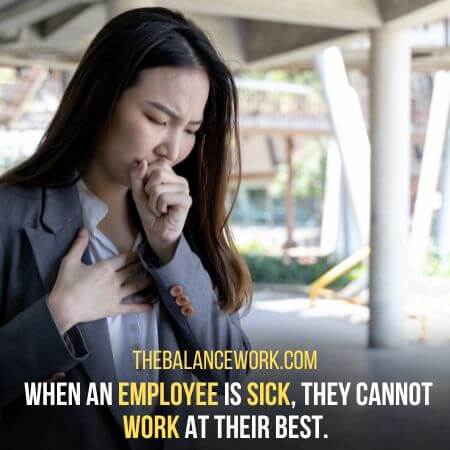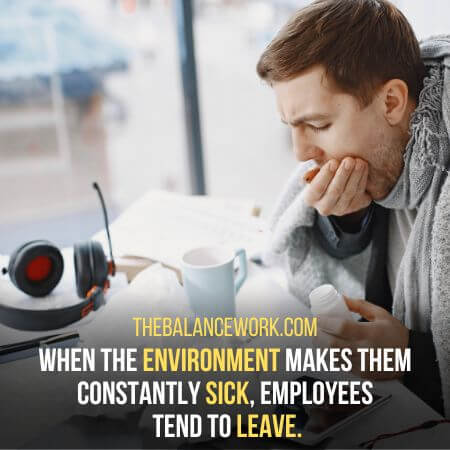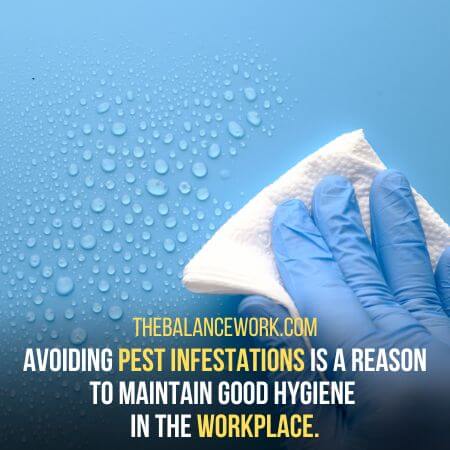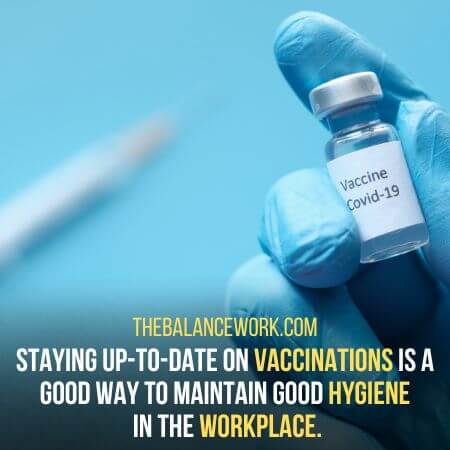There’s a short and simple answer to the question: why is hygiene so important in the workplace – it helps keep everyone healthy!
It’s no secret that hygiene is essential in all aspects of life. But it’s vital in the workplace, where germs can quickly spread from one person to another.
11 Reasons Why Hygiene Is Important In The Workplace
There are many reasons why workplace hygiene is so important. Here are just a few:
1. Prevent Spread Of Diseases:
One of the most important reasons for maintaining good hygiene in the workplace is to prevent the spread of diseases.
Employees who are sick can easily pass their illnesses on to their coworkers.

When someone is sick, they cannot work at their best. The following are many effects of sick employees:
1.1 Absenteeism:
When employees are sick, they tend to take more sick days. This can have a significant impact on productivity and profitability.
This can lead to absenteeism, which can be a significant problem.
It means that there’s one less person available to do the work. But it also means that the company has to pay for the employee’s time off.
This can add up to a lot of money over time!
1.2 Prone To More Mistakes:
Sick employees are more likely to make mistakes. This is because they’re not feeling their best and maybe distracted by their illness.
Making mistakes can lead to a lot of problems, including:
– Wasted time
– Wasted materials
– Damaged products
– Unhappy customers
All of these things can have a significant impact on the bottom line.
1.3 Lower Quality Of Work:
Ill employees may not be able to work at their best. This can lead to lower quality of work.
This can badly affect the company in several ways, including:
– Loss of customers
– Lower sales
– Reduced profits
It is vital to maintain good hygiene in the workplace to prevent diseases. It’s also essential for productivity and profitability.
1.4 Less Customer Satisfaction:
When employees are sick, they may not be able to give customers the same level of service. This can lead to less customer satisfaction.
This can have a big impact on the company, including:
– Lower sales
– Reduced profits
– Bad publicity
This makes the company bear losses in revenue. Moreover, it makes it difficult for the company to get opportunities in the future.
1.5 Turnover Intention:
When the environment makes them constantly sick, employees tend to leave. This is because they’re unhappy with their current situation.
This can lead to high turnover rates, a big problem for companies. High turnover rates can lead to:
– Increased training costs
– Reduced productivity
– Lower morale

All of these things can have a significant impact on the bottom line.
2. To Maintain A Professional Appearance:
Maintaining good hygiene in the workplace is maintaining a professional appearance.
First impressions are essential, and you want your employees to make a good ones!
Potential clients may not do business with you if they think you’re not professional.
So it’s important to ensure that your employees are well-groomed and presentable.
3. To Avoid Unpleasant Odors:
Another reason to maintain hygiene in the workplace is to avoid unpleasant odors.
Bad body odor can be a big turnoff for potential clients or customers.
It can also make your employees less comfortable. And it can create a hostile work environment.
A hostile work environment is not suitable for morale or productivity.
4. To Comply With Health And Safety Regulations:
In some cases, good hygiene in the workplace is necessary by law.
Health and safety regulations must be followed to protect employees from hazardous materials.
If these regulations are not followed, the company can get fined or shut down.
Some instances where health and safety regulations must be followed include:
– Handling food
– Working with chemicals
– Working with hazardous materials
5. To Avoid Pest Infestations:
Avoiding pest infestations is another reason to maintain good hygiene in the workplace.
Pests can be a big problem in any workplace. They can spread diseases and contaminate food.
They can also damage equipment and property.
Pest infestations can be very costly. Therefore, it’s important to do everything you can to avoid them.

Some ways to avoid pest infestations include:
– Keeping the workplace clean
– Putting away food properly
– Disposing of waste properly
– Keeping an eye out for signs of pests
6. For The Sake Of The Environment:
Good hygiene in the workplace is also important for the environment’s sake.
For example:
Following health and safety regulations is essential if you work with hazardous materials.
If these materials are not handled properly, they can cause environmental damage.
Environmental damage can be very costly. It can also lead to bad publicity for the company.
How To Maintain Hygiene In The Workplace?
There are a few things you can do to maintain good hygiene in the workplace.
Some of these things include:
1. Washing Hands Properly:
An important thing you can do to maintain good hygiene in the workplace is wash your hands properly.
Encourage employees to wash their hands after:
– Using the restroom
– Eating
– Coughing or sneezing
– Before handling food
2. Using Disinfectants:
Another way to maintain good hygiene in the workplace is to use disinfectants.
Disinfectants can help to kill germs and bacteria. This can help to prevent the spread of diseases.
Encourage employees to use disinfectants:
– On door handles
– On work surfaces
– In the kitchen
3. Wearing Protective Clothing:
Wear protective clothing is especially important if you work with hazardous materials.
Protective clothing can help prevent the spread of diseases. It can also help protect you from injuries.
Some examples of protective clothing include:
– Gloves
– Apron
– Goggles
– Face masks
– Respirators
4. Staying Up-To-Date On Vaccinations:
Staying up-to-date on vaccinations is a good way to maintain good hygiene in the workplace.

This is especially important if you work with hazardous materials.
Some of the vaccinations that you should consider getting include:
– The flu vaccine
– The hepatitis B vaccine
– The tetanus vaccine
5. Following Good Personal Hygiene Practices:
Encourage employees to follow good personal hygiene practices.
Some of these practices include:
– Showering daily
– Washing hands regularly
– Wearing clean clothes
– Brushing teeth regularly
6. Keeping The Workplace Clean:
Keeping the workplace clean is mandatory for all the right reasons. Encourage employees to:
– Sweep floors
– Dust surfaces
– Empty garbage cans regularly
– Wash dishes properly
7. Reporting Illnesses:
Employees should report any illnesses to their supervisors. Please encourage them to do so without hesitation.
It allows supervisors to make proper accommodations. It’s also essential so that the illness doesn’t spread to others.
For instance:
If an employee has asthma, they should let their supervisor know.
This way, the proper precautions can be taken in an emergency.
For instance:
If an employee has the flu, they should stay home from work.
If an employee has a cold, they should take steps to prevent the spread of the illness.
8. Taking Breaks:
Employees should take breaks if they feel like they need one. This is especially important if they are feeling ill.
Encourage employees to take a break if they:
– Feel nauseous
– Have a headache
– Feel dizzy
9. Sanitizers:
Companies should provide sanitizers for employees to use. Sanitizers can help to kill germs and bacteria.
This can help to prevent the spread of diseases. Sanitizers should be:
– Alcohol-based
– Located in strategic places
Some examples of strategic places include:
– Near the entrance of the workplace
– In the kitchen
– In the bathroom
10. Proper Storage Of Hazardous Materials:
If your company works with hazardous materials, it’s important to store them properly.

Hazardous materials should be:
– Stored in closed containers
– Labeled properly
– Stored in a cool, dry place
In case of a spill, it’s important to:
– Immediately clean it up
– Dispose of the hazardous material properly
11. Proper Food Handling:
Proper food handling means keeping food clean and safe. This includes:
– Washing hands before handling food
– Keeping food preparation areas clean
– Avoiding cross-contamination
– Cooking food properly
If food is not handled properly, it can cause food poisoning.
12. Disposing Of Hazardous Waste Properly:
If your company works with hazardous materials, dispose of them properly.
Hazardous waste should be:
– Disposed of in closed containers
– Labeled properly
– Disposed of in a designated area
Hazardous waste should never be:
– Flushed down the toilet
– Poured down the drain
13. No Smoking:
Smoking is not allowed in the workplace. This is important to maintain good hygiene in the workplace.
Smoking can cause:
– The spread of diseases
– Fires
Moreover, secondhand smoke is just as dangerous as firsthand smoke. That means that employees who smoke can affect those who don’t smoke.
14. Regular Cleanliness Check:
Conduct regular cleanliness checks in the workplace. This is to ensure that the workplace is clean and safe.
The frequency of the cleanliness check will depend on the type of business.
For instance, a restaurant will need to conduct a daily cleanliness check.
On the other hand, an office building may only need to conduct a weekly cleanliness check.
HR Policies That Can Help To Maintain Good Hygiene In The Workplace:
HR can also play a vital role in maintaining good hygiene in the workplace.
Some of the policies that HR can implement include:
1. Employee Health Policy:
The employee health policy should state that employees must maintain good personal hygiene.
It should also state that employees must get vaccinated against certain diseases.

Clauses examples can be:
“All employees must maintain good personal hygiene. This includes regular hand-washing, showering, and using deodorant.”
“All employees must get vaccinated against common diseases. Such as the flu, measles, and mumps.”
2. Smoking Policy:
The smoking policy should state that smoking is not allowed in the workplace.
This policy should also state that employees must not smoke in company vehicles. Also, the policy should note that employees must not smoke near entrances or exits.
An example clause can be:
“Smoking is not allowed in the workplace. This includes smoking in company vehicles and near entrances or exits.”
Conclusion:
Maintaining good hygiene in the workplace is vital for several reasons.
It can help to prevent the spread of diseases. Also, it keeps the workplace clean, and it sets a professional tone.
Companies should provide employees with the resources they need to maintain good hygiene.
This includes things like soap, hand sanitizer, and paper towels.
In addition, companies should have policies in place that encourage good hygiene.
Some of these policies include an employee health policy and a smoking policy.
Last Updated on 2 years ago by Shahzaib Arshad
- 7 Great Signs Your Boss Wants to Help You - October 8, 2023
- How To Explain Dropping Out Of Law School? Detailed Guide - September 6, 2023
- 10 Reasons Employees Get Fired in Workplace - August 27, 2023